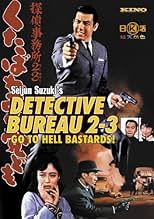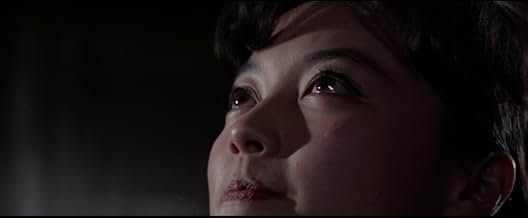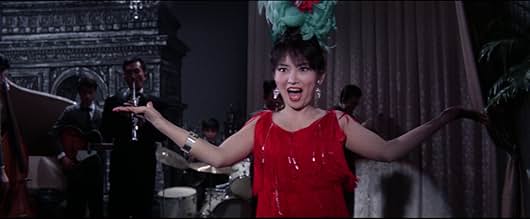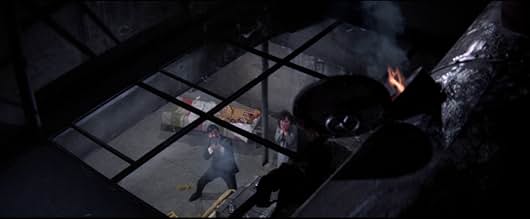Crevez vermines - Détective bureau 2-3
Titre original : Kutabare akutô-domo: Tantei jimusho 23
NOTE IMDb
6,8/10
1 k
MA NOTE
Le lieutenant de police Tajima, chargé de retrouver des armes à feu volées, transforme une rancoeur de la pègre en bain de sang. Suzuki fait d'une poudrière colorée une parodie qui fait mouc... Tout lireLe lieutenant de police Tajima, chargé de retrouver des armes à feu volées, transforme une rancoeur de la pègre en bain de sang. Suzuki fait d'une poudrière colorée une parodie qui fait mouche, sous fond de colonialisme culturel et de cupidité d'après-guerre.Le lieutenant de police Tajima, chargé de retrouver des armes à feu volées, transforme une rancoeur de la pègre en bain de sang. Suzuki fait d'une poudrière colorée une parodie qui fait mouche, sous fond de colonialisme culturel et de cupidité d'après-guerre.
- Réalisation
- Scénario
- Casting principal
Jô Shishido
- Hideo Tajima
- (as Joe Shishido)
Avis à la une
Having seen no comment for this film, I decide to put up my own. This is the first Suzuki film that I saw, What struck me about the film was how accessible it was to western audiences. It really was a 60's crime thriller, Joe Shishido could easily be the Japanese James Bond. Another thing that struck me was the music, having become accustomed to hearing traditional chants and whistle tunes in Chambara films, I was surprised to hear a song that could effortlessly be converted to English. Not only that but I really did like the music in the film, I also have a feeling that Suzuki is a man of music, as it seems to be a crucial element in all his films.
Although by no means a masterpiece, I do think that this is a light, enjoyable film, not as heavy going as some other Japanese films. If you are interested in discovering Japanese Pop Cinema, I think that this is an easy beginner's step but that's just one man's opinion, check it out for yourself.
7/10
Although by no means a masterpiece, I do think that this is a light, enjoyable film, not as heavy going as some other Japanese films. If you are interested in discovering Japanese Pop Cinema, I think that this is an easy beginner's step but that's just one man's opinion, check it out for yourself.
7/10
Seijun Suzuki is, without question, one of a kind. I've never agreed with the popular perception of him as a cinematic genius, but he's an original, unique, innovative filmmaker that deserves respect.
"Detective Bureau 2-3: Go to Hell Bastards" stars Suzuki's number one man — the actor he cast for the lead of so many of his films — Jô Shishido. I've never cared for Shishido. His ridiculous ultra-cool, ultra-tough guy routine is so transparent that it's impossible for me to take him at all seriously. Fortunately, in this film, we don't have to take him seriously. We're meant not to. And so all the things that normally get under my skin about Shishido work here to enhance the film's overall enjoyability. For the first time I was really able to enjoy him as an actor.
Suzuki, on the other hand, I always enjoy. He doesn't have Ozu's spiritual, emotional potency or formal mastery; he doesn't have Mizoguchi's palpable atmosphere or incredible sense of mood and tone; he doesn't have Ôshima's political conscience or unflinching psychological deconstructions of human self-destructiveness; he doesn't have Teshigahara's deeply philosophical genius, or Imamura's profound comic satire based in existential discontent. Standing next to the true geniuses of Japanese cinema, Suzuki isn't really an artist at all. He's more of, well, a confectioner. But there's nothing wrong with a little treat sometimes, and I personally deeply enjoy Suzuki's brand of confection.
Frankly, I think Seijun Suzuki is a wonderful filmmaker. Not a brilliant one, mind you, but a wonderful one. His films are filled with an energy and an unpredictability that shouldn't be difficult for anyone to appreciate. They are narratively erratic, visually stunning, and completely off the wall. "Detective Bureau" is no exception. In fact, it's probably one of his most outright delightful works.
Here we find Suzuki at a place somewhere between the studio fare he had been making previously and the more radical, completely unhinged cinema we'd see in the years to come. Consequently, this may have been the film that elevated him to auteur status and gave him his own, unique identity as a filmmaker. The film was made at Nikkatsu, one of Japan's biggest film studios at the time. Nikkatsu had started churning out a lot of crime films in the '50s. Influenced largely by French and especially American film noir, films such as Kurahara's "I Am Waiting" and Masuda's "Rusty Knife" were quality films, but were very formulaic and lacking any real authorial stamp from their directors. Suzuki had been directing films for Nikkatsu since his 1956 debut film, and in 1960 he released "Take Aim at the Police Van", which was one such crime film. It's the only Suzuki film I've seen that was released before "Detective Bureau". Essentially a studio hand, Suzuki was clearly not the auteur then that he would later become. And yet, there were a few moments in that film that foreshadowed his distinct style — one moment in particular, in which the film bounces to life as a prostitute is chased down the street to the sound of a classic rock-and-roll tune on a nearby jukebox.
It's these moments that distinguish Suzuki as a filmmaker, and "Detective Bureau" is chock-full of them. One sequence actually has Jô Shishido standing up in a nightclub and unexpectedly taking part in a musical number that sounds like something out of a Jacques Demy film. It could be hokey and atrocious, if it weren't for Suzuki's immense gift for turning everything absurd into wonderful, playful farce. Another scene involves Shishido and the film's female lead at another nightclub, where a rock band with a female Japanese vocalist plays music that is so laughably non-Japanese that it's hard not to giggle at the circus of Americanized cultural overload that Suzuki presents us with (Suzuki didn't explore the theme of postwar westernization to the extent that many of his contemporaries did, but he certainly highlighted this sudden change in the Japanese landscape in his own, inimitable way). And then, of course, there is the scene with several half-naked Japanese girls dancing to "When the Saints Go Marching In".
Suzuki spins a decent little crime yarn here, but in that department this really is a pretty subpar effort. It's the incredible moments of pure cinematic elation that make the film the joyous experience it is. The plot is not very interesting, but that's the beauty of Suzuki's cinema: It never has to be. "Youth of the Beast", "Tokyo Drifter", "Branded to Kill" — in all these films, Suzuki pulls you along through a visually astonishing, absurdist Japanese landscape in which nothing is predictable and everything is preposterous. There are immaturities in his films, of course -- they lack any real substance or depth -- but Suzuki's strength is his ability to transcend the necessity for those things. His films are always completely unconventional and always completely enjoyable, in spite of their shortcomings.
Suzuki was undoubtedly the most stylistically experimental of the Japanese New Wave directors. There wasn't much there in terms of content, but formally, he was a true master. His high-energy, genre-bending, pop art style was very unique, and his films were always aesthetically pleasing. "Detective Bureau" doesn't have the stylistic supremacy of, for example, "Tokyo Drifter", but there is some really great fluorescent lighting and some hot windows, et cetera, that, visually speaking, really make it a pleasure to watch.
This is not a great film, but I feel about it much the same way I feel about Suzuki in general: not brilliant, but wonderful in his way. It is a good film, because it is a fun film. Right from the fast-paced, high-energy rock-and-roll song that underlines the opening credits, all the way through that same song accompanying the film's fantastic final shot, this film is a blast. It's charismatic, charming, and full of life.
RATING: 7.33 out of 10 stars
"Detective Bureau 2-3: Go to Hell Bastards" stars Suzuki's number one man — the actor he cast for the lead of so many of his films — Jô Shishido. I've never cared for Shishido. His ridiculous ultra-cool, ultra-tough guy routine is so transparent that it's impossible for me to take him at all seriously. Fortunately, in this film, we don't have to take him seriously. We're meant not to. And so all the things that normally get under my skin about Shishido work here to enhance the film's overall enjoyability. For the first time I was really able to enjoy him as an actor.
Suzuki, on the other hand, I always enjoy. He doesn't have Ozu's spiritual, emotional potency or formal mastery; he doesn't have Mizoguchi's palpable atmosphere or incredible sense of mood and tone; he doesn't have Ôshima's political conscience or unflinching psychological deconstructions of human self-destructiveness; he doesn't have Teshigahara's deeply philosophical genius, or Imamura's profound comic satire based in existential discontent. Standing next to the true geniuses of Japanese cinema, Suzuki isn't really an artist at all. He's more of, well, a confectioner. But there's nothing wrong with a little treat sometimes, and I personally deeply enjoy Suzuki's brand of confection.
Frankly, I think Seijun Suzuki is a wonderful filmmaker. Not a brilliant one, mind you, but a wonderful one. His films are filled with an energy and an unpredictability that shouldn't be difficult for anyone to appreciate. They are narratively erratic, visually stunning, and completely off the wall. "Detective Bureau" is no exception. In fact, it's probably one of his most outright delightful works.
Here we find Suzuki at a place somewhere between the studio fare he had been making previously and the more radical, completely unhinged cinema we'd see in the years to come. Consequently, this may have been the film that elevated him to auteur status and gave him his own, unique identity as a filmmaker. The film was made at Nikkatsu, one of Japan's biggest film studios at the time. Nikkatsu had started churning out a lot of crime films in the '50s. Influenced largely by French and especially American film noir, films such as Kurahara's "I Am Waiting" and Masuda's "Rusty Knife" were quality films, but were very formulaic and lacking any real authorial stamp from their directors. Suzuki had been directing films for Nikkatsu since his 1956 debut film, and in 1960 he released "Take Aim at the Police Van", which was one such crime film. It's the only Suzuki film I've seen that was released before "Detective Bureau". Essentially a studio hand, Suzuki was clearly not the auteur then that he would later become. And yet, there were a few moments in that film that foreshadowed his distinct style — one moment in particular, in which the film bounces to life as a prostitute is chased down the street to the sound of a classic rock-and-roll tune on a nearby jukebox.
It's these moments that distinguish Suzuki as a filmmaker, and "Detective Bureau" is chock-full of them. One sequence actually has Jô Shishido standing up in a nightclub and unexpectedly taking part in a musical number that sounds like something out of a Jacques Demy film. It could be hokey and atrocious, if it weren't for Suzuki's immense gift for turning everything absurd into wonderful, playful farce. Another scene involves Shishido and the film's female lead at another nightclub, where a rock band with a female Japanese vocalist plays music that is so laughably non-Japanese that it's hard not to giggle at the circus of Americanized cultural overload that Suzuki presents us with (Suzuki didn't explore the theme of postwar westernization to the extent that many of his contemporaries did, but he certainly highlighted this sudden change in the Japanese landscape in his own, inimitable way). And then, of course, there is the scene with several half-naked Japanese girls dancing to "When the Saints Go Marching In".
Suzuki spins a decent little crime yarn here, but in that department this really is a pretty subpar effort. It's the incredible moments of pure cinematic elation that make the film the joyous experience it is. The plot is not very interesting, but that's the beauty of Suzuki's cinema: It never has to be. "Youth of the Beast", "Tokyo Drifter", "Branded to Kill" — in all these films, Suzuki pulls you along through a visually astonishing, absurdist Japanese landscape in which nothing is predictable and everything is preposterous. There are immaturities in his films, of course -- they lack any real substance or depth -- but Suzuki's strength is his ability to transcend the necessity for those things. His films are always completely unconventional and always completely enjoyable, in spite of their shortcomings.
Suzuki was undoubtedly the most stylistically experimental of the Japanese New Wave directors. There wasn't much there in terms of content, but formally, he was a true master. His high-energy, genre-bending, pop art style was very unique, and his films were always aesthetically pleasing. "Detective Bureau" doesn't have the stylistic supremacy of, for example, "Tokyo Drifter", but there is some really great fluorescent lighting and some hot windows, et cetera, that, visually speaking, really make it a pleasure to watch.
This is not a great film, but I feel about it much the same way I feel about Suzuki in general: not brilliant, but wonderful in his way. It is a good film, because it is a fun film. Right from the fast-paced, high-energy rock-and-roll song that underlines the opening credits, all the way through that same song accompanying the film's fantastic final shot, this film is a blast. It's charismatic, charming, and full of life.
RATING: 7.33 out of 10 stars
This was made slightly before the time when Suzuki began to experiment with the medium more radically. That would be Youth of the Beast. This one is more straightforward. Yet it is not any less entertaining. The guy was a heck of a director, even when he was apparently bored with what he saw as generic assignments. Jo Shishido stars as a private detective. He is hired by the police to infiltrate a yakuza gang to help them stop their gun running ring. The story doesn't always make a ton of sense, but it moves along so quickly that you might only realize it later. Shishido is awesome, and the film includes three wildly colored musical numbers (at night clubs - it's in no way a musical). Jo Shishido even joins into one of the numbers, which is just orgasmic!
Not really an early film for Seijun Suzuki but he is at last unleashed into the world of 'A' features and begins to make his mark. This is a truly wonderful, brilliantly coloured widescreen print on the Arrow Blu-ray and if the director is only beginning his playfulness with splashes of vivid colour and idiosyncratic, almost surreal moments, it is a good start. The story itself preposterous but with guns blazing this barely stops with action throughout, much of it around what must be Yokohama with wharves and warehouses a plenty. If not all the cast are up to the level of charismatic Jo Shishido his performance is pretty much enough to carry this. Used to the odd musical number in yakuza films, here we get three scorchers on a Christmas theme complete with bikinis (!) and Diamond Guy, Shishido even joins in. Not a great film but great fun.
I have no idea why, but Japanese actor Jô Shishido apparently had plastic surgery in order to give him squirrel-like cheeks (you know--filled with acorns)!! This is according to IMDb and I have wondered why he would do this and why the director would keep starring this odd man in his films. I assume Suzuki just had some sort of cheek fetish! Regardless, it's pretty weird.
The film begins with some Yakuza (Japanese mobsters) being viciously gunned down during an illegal transaction of guns. Who did this is unknown--and a private detective (Mr. Squirrel) offers to solve the crime if the cops pay him and give him a new identity. Apparently there is another guy who is a mobster and part-time chipmunk, so they give him fake i.d. for that guy and agree to the rest of his terms. I didn't realize that cops accepted freelance commissions! The film, quite honestly, then gets a little confusing--something I noticed in other Suzuki films. But, the style is so cool and the story so full of neat little twists, that I didn't terribly mind. I am not sure why, but they cast a deliberately bad actress who apparently talks through her nose and dresses like a man as Squirrel-boy's assistant. Why?! I guess it's just another weird touch in a generally weird film. Another thing you do need to say about this film is that it has fantastic music--very 1960s and very cool. It's sort of like James Bond music, cool jazz and Beach movie music combined! And in addition, there are some very kooky music numbers in nightclubs that you just have to see. Weird and fun.
The film begins with some Yakuza (Japanese mobsters) being viciously gunned down during an illegal transaction of guns. Who did this is unknown--and a private detective (Mr. Squirrel) offers to solve the crime if the cops pay him and give him a new identity. Apparently there is another guy who is a mobster and part-time chipmunk, so they give him fake i.d. for that guy and agree to the rest of his terms. I didn't realize that cops accepted freelance commissions! The film, quite honestly, then gets a little confusing--something I noticed in other Suzuki films. But, the style is so cool and the story so full of neat little twists, that I didn't terribly mind. I am not sure why, but they cast a deliberately bad actress who apparently talks through her nose and dresses like a man as Squirrel-boy's assistant. Why?! I guess it's just another weird touch in a generally weird film. Another thing you do need to say about this film is that it has fantastic music--very 1960s and very cool. It's sort of like James Bond music, cool jazz and Beach movie music combined! And in addition, there are some very kooky music numbers in nightclubs that you just have to see. Weird and fun.
Le saviez-vous
- ConnexionsFeatured in Seijun Suzuki | TCM (2013)
Meilleurs choix
Connectez-vous pour évaluer et suivre la liste de favoris afin de recevoir des recommandations personnalisées
Détails
- Date de sortie
- Pays d’origine
- Langue
- Aussi connu sous le nom de
- Detective Bureau 2-3: Go to Hell Bastards!
- Société de production
- Voir plus de crédits d'entreprise sur IMDbPro
- Durée1 heure 28 minutes
- Rapport de forme
- 2.45 : 1
Contribuer à cette page
Suggérer une modification ou ajouter du contenu manquant

Lacune principale
By what name was Crevez vermines - Détective bureau 2-3 (1963) officially released in India in English?
Répondre























